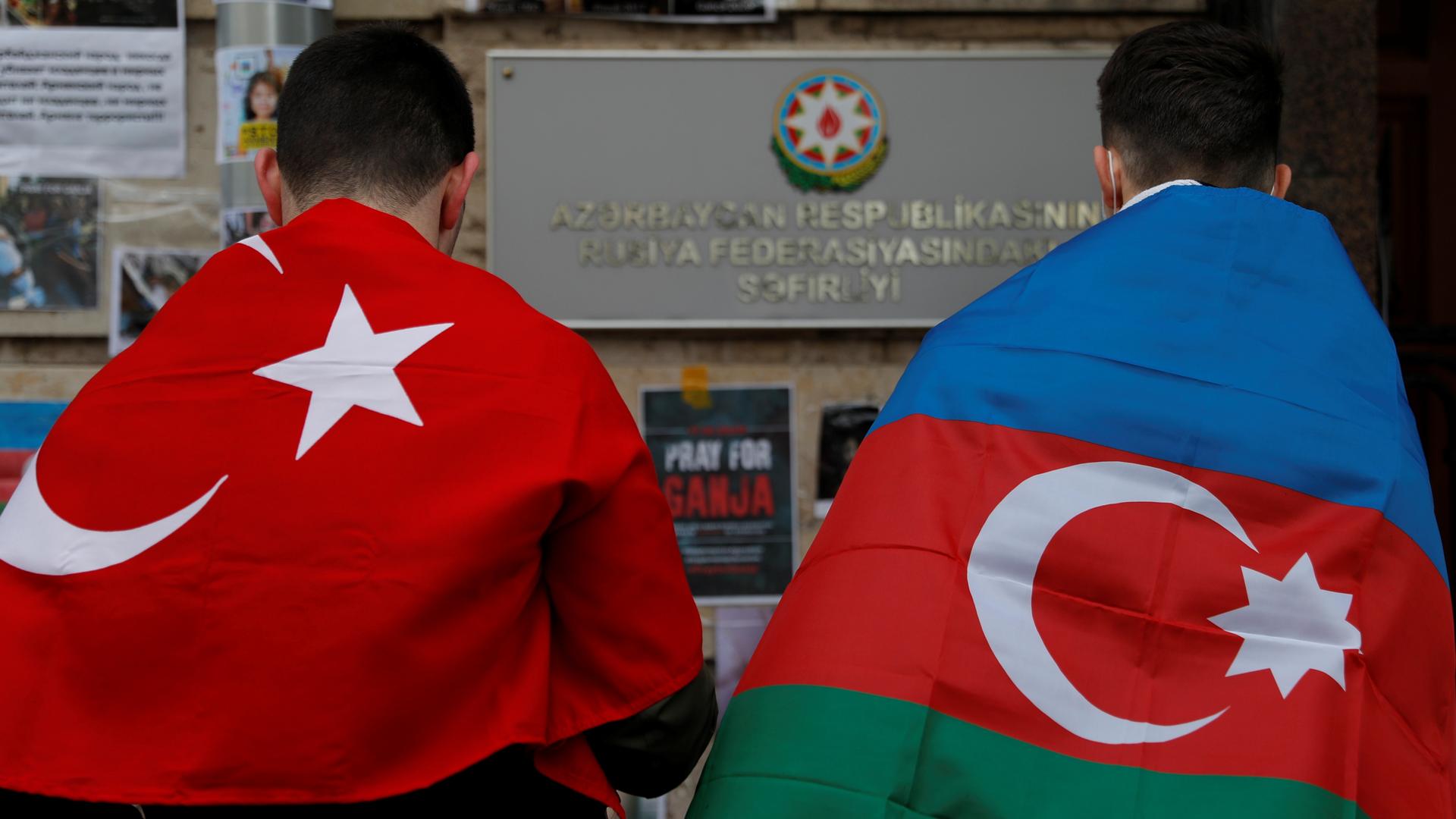Turkey’s Vice President Fuat Oktay has said Ankara will not hesitate to send soldiers and provide military support for Azerbaijan if such a request is made by Baku, and added that there was no such request at the moment.
Earlier, Armenia’s prime minister said he saw no possibility of a diplomatic solution at this stage in the Nagorno-Karabakh conflict with Azerbaijan. Ankara has vowed full solidarity with Baku and has accused Yerevan of occupying Azerbaijan lands.
Speaking in an interview with broadcaster CNN Turk on Wednesday, Oktay also criticised the OSCE’s Minsk group – formed to mediate the conflict and led by France, Russia and the United States – of trying to keep the issue unresolved and supporting Armenia, both politically and militarily.
Azerbaijan liberates 21 villages, town from occupation
The Azerbaijani army has liberated 21 more villages in Fuzuli, Jabrayil and Zangilan provinces from Armenian occupation, Azerbaijan’s president announced.
“Azerbaijan’s glorious Army has liberated Gejegozlu, Ashagi Seyidahmadli and Zerger villages of Fuzuli district, Baland, Papi, Tulus, Hajili and Tinli villages of Jabrayil district. Long live Azerbaijan’s Army! Karabakh is Azerbaijan!” Ilham Aliyev said on Twitter.
READ MORE: Azerbaijan: Military ops to retake Armenian-occupied areas ongoing
In another tweet, Aliyev said the army has also liberated “Minjivan town, and Khurama, Khumarli, Saril, Babayli, Uchunju Agali, Hajalli, Girakh Muslan, Udgun, Turabad, Ichari Muslan, Melikli, Jahangirbeyli and Baharli villages of Zengilan district” from the Armenian occupation.
Amid ongoing clashes, the Azerbaijani army has so far liberated over 130 towns and villages from the Armenian occupation, according to officials sources.
Zangilan was occupied by Armenian forces on October 29, 1993.
Azerbaijan: Armenia ‘disrespectful’ of int’l community
An Azerbaijani presidential aide on Wednesday accused Armenia’s premier of disrespecting the international community over his recent call on civilians to fight in the front against Azerbaijan in ongoing clashes to which there would be “no diplomatic solution.”
In a written statement, Hikmet Hajiyev, assistant to the Azerbaijani president, responded to statements by Armenian Prime Minister Nikol Pashinyan that the conflict in the Nagorno-Karabakh region and its surroundings could not be resolved diplomatically.
Arguing that these remarks once again demonstrated that Armenia was “not interested at all in the peaceful resolution of the conflict,” Hajiyev said Yerevan intended to continue occupying Azerbaijani territories.
Underlining that Pashinyan “recklessly” and “for the sake of his political ambitions” encouraged all civil bodies and civilians to take up arms, Hajiyev said this official position “proves” which side broke past humanitarian ceasefires and contributed to the “escalation of the situation in the region.”
New clashes
Since fresh clashes erupted on September 27, Armenia has continued its attacks on civilians and Azerbaijani forces, even violating humanitarian cease-fire agreements.
In two missile attacks on Ganja, a major Azerbaijani city far from the front line, Armenia killed some two dozen civilians, including children, and injured scores more.
Last Thursday, Armenia targeted civilians at a cemetery in the western city of Tartar, killing four and injuring four others.
Since October 10, Armenia has violated two humanitarian cease-fires in Upper Karabakh, or Nagorno-Karabakh, an internationally recognised territory of Azerbaijan.
A new humanitarian ceasefire entered into force last Saturday.
‘NATO is not part of conflict’
NATO is not a part of the conflict in Nagorno-Karabakh, the bloc’s secretary-general said on Wednesday.
“I reminded the [Armenian] president that NATO is not part of this conflict. Both Armenia and Azerbaijan have been valued NATO partners for more than 25 years,” said Jens Stoltenberg in a joint news conference with Armenia’s President Armen Sarkissian.
READ MORE: How celebrities complicate the Armenia-Azerbaijan conflict
“NATO is deeply concerned by ongoing violations of the ceasefire, which have caused tragic loss of life,” said Stoltenberg, adding that ending hostilities and sufferings is important for both the alliance and international security.
“It is vital that all sides now show restraint, observe the cease-fire, and de-escalate. Any targeting of civilians is unacceptable and must stop,” he said.
Upper Karabakh conflict
Relations between the two former Soviet republics have been tense since 1991, when the Armenian military occupied Nagorno-Karabakh.
Four UN Security Council resolutions and two from the UN General Assembly, as well as international organisations, demand the “immediate complete and unconditional withdrawal of the occupying forces” from occupied Azerbaijani territory.
In total, about 20 percent of Azerbaijan’s territory – including Nagorno-Karabakh and seven adjacent regions – has been under Armenian occupation for nearly three decades.
The Organization for Security and Co-operation in Europe (OSCE) Minsk Group – co-chaired by France, Russia, and the US – was formed in 1992 to find a peaceful solution to the conflict, but to no avail. A ceasefire, however, was agreed to in 1994.
World powers, including Russia, France, and the US, have called for a sustainable ceasefire. Turkey, meanwhile, has supported Baku’s right to self-defence and demanded the withdrawal of Armenia’s occupying forces.










Discussion about this post